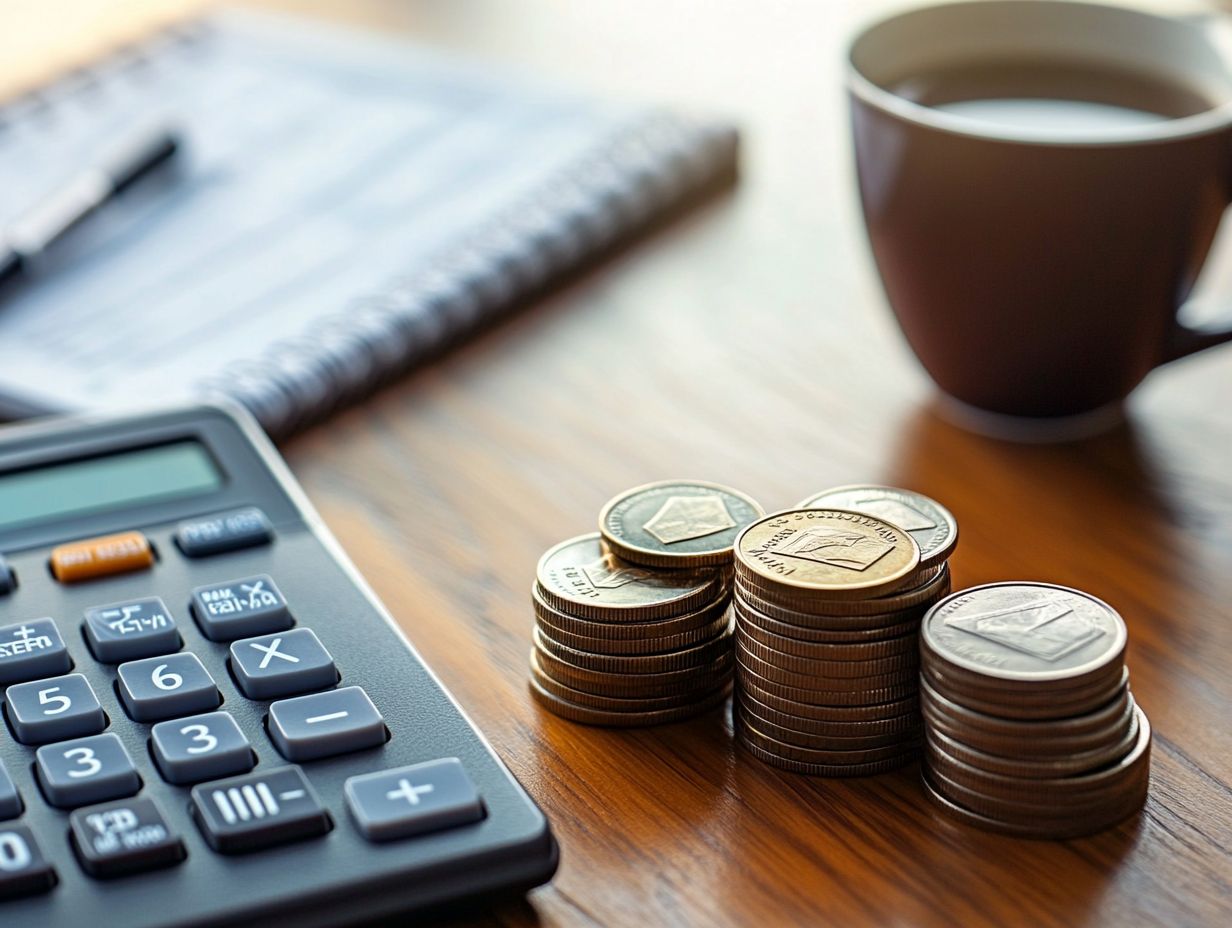Why Freelancers Need a Larger Emergency Fund
Contents
- Key Takeaways:
- The Importance of an Emergency Fund for Freelancers
- How Much Should Freelancers Save for Emergencies?
- Common Emergencies for Freelancers
- Strategies for Building and Maintaining an Emergency Fund
- Benefits of Having a Larger Emergency Fund
- Frequently Asked Questions
- Why should freelancers have a larger emergency fund?
- What types of unexpected expenses can a freelancer encounter?
- How much should a freelancer have in their emergency fund?
- What happens if a freelancer doesn’t have a sufficient emergency fund or is faced with job loss?
- Can freelancers rely on credit cards or loans instead of an emergency fund?
- What are some strategies for building a larger emergency fund as a freelancer?
Key Takeaways:
- Freelancers should save for emergencies as their income is not stable.
- The amount to be saved for emergencies depends on factors like expenses and income.
- Building a larger emergency fund provides financial security and flexibility in business decisions.
The Importance of an Emergency Fund for Freelancers
The importance of an emergency fund for freelancers is amplified by the unpredictable nature of freelance income, which can fluctuate significantly based on client demand and market conditions.
An emergency fund offers readily accessible cash to cover important bills during unforeseen situations, such as medical bills or auto repairs.
By ensuring that basic living costs are covered, emergency funds help alleviate financial stress during periods of job loss or other unexpected challenges. This prevents the need to rely on high-interest debt.
Understanding the Freelance Income Cycle
The freelance income cycle refers to the way freelancers get paid over time. Understanding this cycle is essential for effective money management, especially when managing uneven cash flows and preparing for unexpected expenses.
The freelance income cycle exhibits a high degree of variability, with income fluctuating significantly from month to month. This unpredictability makes it crucial for freelancers to adopt rigorous budgeting practices to navigate both prosperous and lean periods.
Tools such as budgeting apps, spreadsheets, and expense trackers can assist in maintaining a clear understanding of one’s financial health. Freelancers can also benefit from setting aside a portion of each payment to build a rainy day fund, ensuring that they have funds available for unforeseen circumstances.
How Much Should Freelancers Save for Emergencies?
Freelancers should aim to save an amount equivalent to at least three to six months of their living expenses for emergencies. The general guideline is to maintain an emergency fund that covers three to six months’ worth of expenses.
Factors to Consider in Determining the Amount
When determining how much money to save in an emergency fund, several factors should be considered, including potential inflation, the cost of living, and the risks associated with unexpected expenses.
It’s important to evaluate personal financial circumstances, such as levels of debt and income stability. If someone is burdened with significant credit card debt, they may prioritize paying it off, which could result in saving less money in the short term.
A steady income stream can also help enhance the size of an emergency fund due to a more predictable monthly cash flow. Personal situations vary; for example, an individual with dependents may require a larger safety net than someone who is single.
This is why understanding these concepts can help create a savings plan that fits your needs!
Common Emergencies for Freelancers
Freelancers often face emergencies that can significantly impact their financial health! Unexpected expenses such as medical bills, loss of income, and auto repairs can create substantial financial strain if there is insufficient advance planning.
Unexpected Expenses and Loss of Income
Unexpected expenses and loss of income are major concerns for freelancers. These issues can lead to significant financial stress, affecting both personal and professional lives.
To tackle these challenges, freelancers should build a strong emergency savings fund. Experts recommend saving enough to cover three to six months’ worth of expenses as a buffer during tough times.
A recent survey found that nearly 70% of freelancers experience unexpected financial disruptions at least once a year. By prioritizing savings, freelancers can protect their livelihoods against unforeseen events, such as a sudden decline in client work or unexpected healthcare costs.
This financial cushion promotes stability and fosters peace of mind, enabling a more focused and productive work environment.
Strategies for Building and Maintaining an Emergency Fund
Resources for building an emergency fund include savings accounts that offer higher interest rates, budgeting for both short-term and long-term savings, and considering automatic savings plans.
Short-term budgets should cover essential items like groceries, fuel, rent, and utilities. Allocate amounts from your available funds each month. Long-term budgeting should focus on fixed expenses such as insurance, taxes, and maintenance, as well as debt repayment.
Start your emergency fund journey by calculating how much you need. A good rule of thumb is to save three to six months’ worth of expenses. The next step is to consistently save for the fund by regularly depositing money into a separate savings account designated solely for emergencies.
While funds should be easily accessible in case of an emergency, they should not be so reachable that they are spent frivolously.
An effective way to maintain easy access while ensuring safety is to use a savings account that offers higher interest rates. These typically offer interest rates significantly higher than those at traditional banks. Alternatively, an emergency fund can also be held in a money market account or a low-risk investment account, which can be accessed through checks or debit cards.
It’s important to remember that the principal value of these accounts may fluctuate. Even if funds are not immediately accessible, they can usually be sold or withdrawn within a short time frame.
Another option is to utilize automatic savings plans, which can help track financial goals and facilitate saving a predetermined amount each month. Ensure these plans are flexible enough to allow for adjustments if circumstances change.
Effective Saving Techniques
Effective saving practices are crucial for freelancers who wish to establish a strong emergency savings account to navigate unexpected financial challenges. One effective starting point is the 50/30/20 budgeting rule, which recommends allocating 50% of income for needs, 30% for wants, and 20% for savings and debt repayment.
Setting up automatic transfers from checking to savings accounts can strengthen savings without relying solely on willpower. Placing funds in high-yield savings accounts, which may offer interest rates exceeding 10 times the national average, can maximize earnings.
By implementing these strategies, freelancers can build a financial buffer that offers protection against income changes.
Managing Cash Flow for Emergencies
Freelancers who manage their cash flow effectively can navigate emergencies without experiencing financial hardship. Independent workers must closely monitor cash flow, as they often encounter unpredictable income and expenses due to their work’s nature.
Using budgeting software or apps can assist freelancers in tracking cash flow and understanding spending trends. Maintaining up-to-date financial records enables freelancers to keep liquidity, ensuring they are prepared for unexpected expenses.
Understanding income cycles is crucial for freelancers, especially when dealing with seasonal work or project-based contracts. This knowledge allows freelancers to plan ahead and avoid cash flow challenges.
Benefits of Having a Larger Emergency Fund
A larger emergency fund provides freelancers with financial security and peace of mind. This enables them to make more flexible business decisions without the stress of unexpected financial burdens.
Financial Security and Peace of Mind
Having a well-funded emergency fund offers two significant advantages: financial security and peace of mind. This preparation helps freelancers navigate uncertainties in their financial situations.
When freelancers feel secure in their finances, they can concentrate better on their projects. This enhances their creativity and productivity.
This sense of stability enables them to take well-thought-out choices, such as pursuing higher-paying clients or exploring new ventures. They can do this without the constant worry of delays in receiving payments.
Financial experts emphasize that a solid financial foundation not only reduces stress but also gives freelancers the power to make more informed decisions. With an adequate financial cushion, they can invest in personal development, tools, and resources that enhance their skills, ultimately leading to better service for clients and a more fulfilling career.
Flexibility in Business Decisions
A substantial emergency fund provides freelancers with the flexibility to make business decisions that enable them to pursue new opportunities, pivot their services, or take calculated risks without fearing immediate financial repercussions.
This financial cushion allows them to explore diverse projects, collaborate with innovative partners, or invest in professional development courses that enhance their skills and marketability.
Knowing they have a safety net fosters confidence, encouraging freelancers to envision their ideal careers and actively pursue pathways that lead them there.
This gives freelancers the power to transform hesitation into action, facilitating strategic moves that can elevate their brands while maintaining financial stability.
A well-stocked emergency fund opens doors to survival and growth, allowing freelancers to thrive in an ever-evolving marketplace.
Frequently Asked Questions
Here are some common questions freelancers often have about emergency funds.
Why should freelancers have a larger emergency fund?
Freelancers often face income ups and downs. That’s why having a solid emergency fund is a game-changer! A larger emergency fund is crucial to cover unexpected expenses or periods of low income.
What types of unexpected expenses can a freelancer encounter?
As a freelancer, you may have to cover unexpected expenses such as equipment repairs, client cancellations, or personal emergencies without the safety net of a traditional job’s benefits.
How much should a freelancer have in their emergency fund?
Financial experts recommend freelancers have at least 6-12 months’ worth of living expenses saved in their emergency fund, considering the unpredictable nature of their income.
What happens if a freelancer doesn’t have a sufficient emergency fund or is faced with job loss?
A freelancer without a sufficient emergency fund may find themselves struggling to cover expenses during periods of low income or unexpected expenses. This can lead to financial stress and potential debt.
Can freelancers rely on credit cards or loans instead of an emergency fund?
While credit cards and loans may provide temporary relief, they often come with high interest rates and can lead to long-term debt. Having a dedicated emergency fund can help freelancers avoid this financial burden.
What are some strategies for building a larger emergency fund as a freelancer?
Some strategies include setting aside a percentage of each paycheck, taking on additional clients or projects, and cutting back on unnecessary expenses to increase savings. It may also be helpful to work with a financial advisor for personalized guidance.










